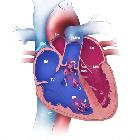Fetales Alkoholsyndrom
Fetal alcohol syndrome (FAS) is a potential syndromic complication that can occur with maternal pre-natal alcohol exposure. It is also broadly categorized as fetal alcohol spectrum disorders (FASD) due to the fact that the fetus may not show all the features and the broad spectrum of effects on the fetus from alcohol.
Epidemiology
It is considered one of the commonest preventable causes of intellectual impairment. The estimated incidence in the western world is at around 0.2-1% of live births for FAS and ~10% for FASD . It may affect up to 20-40% of pregnancies in mothers with chronic alcohol abuse .
Clinical features
The spectrum of features include:
Facial/oral
- short palpebral fissures
- epicanthus
- smooth philtrum
- mid facial hypoplasia
- long thin upper lip
- delayed dental development
Cranial/CNS
- microcephaly
- intellectual impairment
- corpus callosum agenesis/ dysgenesis
- focal cortical thickening
- hearing disorders and/or ear anomalies
Skeletal
- delayed bone development
- pectus excavatum
- vertebral segmental anomalies: congenital scoliosis
- limb anomalies
- fusion of upper limbs: radio-ulnar synostoses
- stippled epiphyseal calcifications
Cardiac
- septal defects
- cono-truncal anomalies
Ocular/ophthalmic
- ptosis
- strabismus
- optic nerve hypoplasia
Renal
- dysplastic kidneys
Genitourinary
- hypoplasia of external genitalia
Other
- evidence of intrauterine growth restriction (IUGR)
Complications
- alcohol withdrawal may occur in infancy
Siehe auch:
- Pectus excavatum
- Atriumseptumdefekt
- Mikrozephalie
- Intrauterine Wachstumsretardierung
- Ventrikelseptumdefekt
- mid facial hypoplasia
- Mittelgesichtshypoplasie
und weiter:

 Assoziationen und Differentialdiagnosen zu Fetales Alkoholsyndrom:
Assoziationen und Differentialdiagnosen zu Fetales Alkoholsyndrom:




